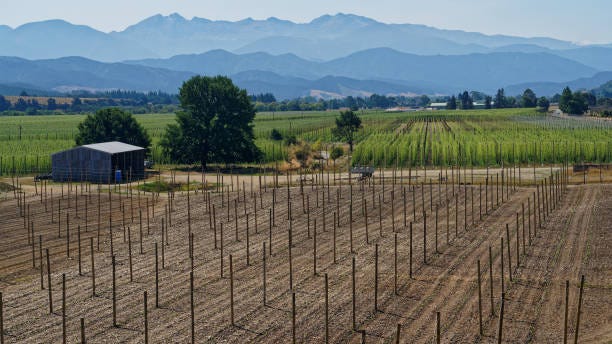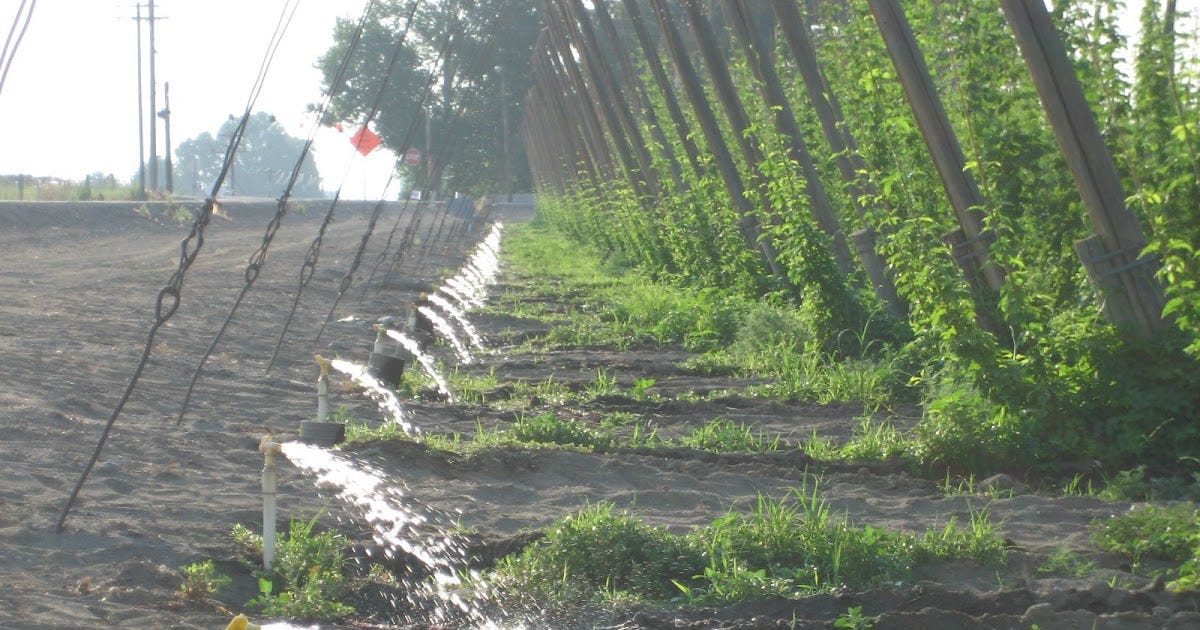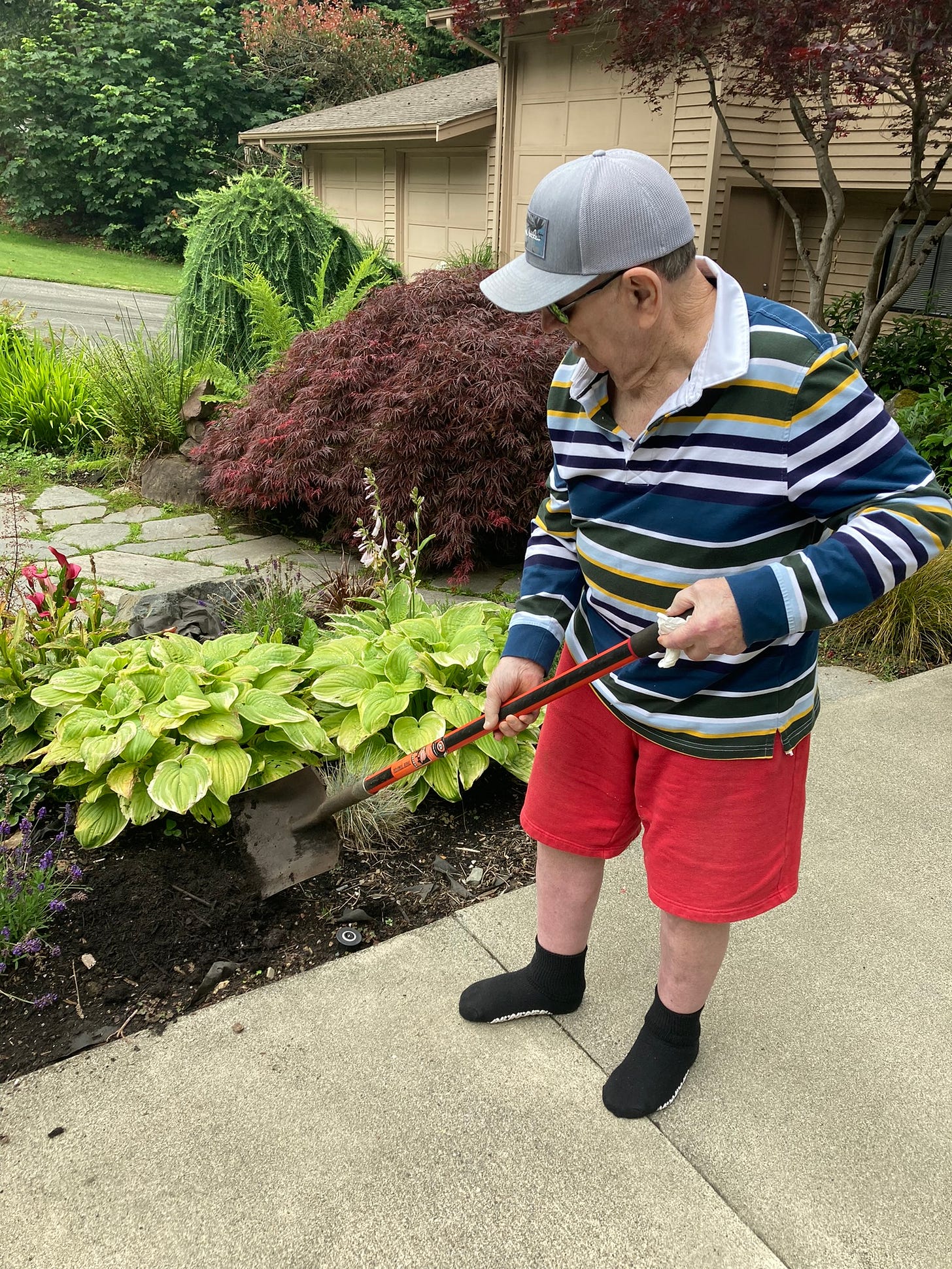Cooking a Life: Part I—Of Shovels and Weeds
Ingredient list: generous dash of hard work; irrigation water; no weeds please; heat w/propane fire; no sage required in this recipe but feel free to add one chocolate chip cookie! Stir with shovel.
There’s nothing like the life of a farmer, especially when that farmer owns, tends, manages, and farms his own land. No one else will do it for them—so, for most of the three seasons of the year that took us through the Spring field prep all the way through to harvest and the work to repair and clean the harvest machines and kilns, farming was an all-encompassing, 24/7 way of life (that fourth season? Winter? Well, that’s for work of a different kind—tending to tractors, bills, accounting, “puttering around cuz there isn’t as much to do,” etc.).
And hops are their own brand of relentless (if you are beer drinker, kiss a hop farmer next time you see one—my Dad’s available…just an FYI!). Hops were our life. Dad managed somewhere around 130-ish acres of hops in Moxee; they were my Dad’s entire existence—though for an early time in our family, my Dad grew sage when we lived in Toppenish, and later in his farming career my Dad dabbled in apples.
But I wanted to share one aspect of “the work” on a farm that has stuck in my mind when I think of Dad: namely, his skill with a shovel. This was fresh in my mind as we had 10 yards of compost delivered last week and I made Dad promise he was going to help spread it all in our landscape beds.
We joke that shovels “fit any hand, any time” but a shovel in the hands of a skilled farmer is something to behold and appreciate if you look at it with the right eyes. Even when I was young, and Dad was teaching Trevor and me how to irrigate the fields by shoveling trenches (WAY before the high tech irrigation systems and drip lines they use now!), I admired greatly how my Dad shoveled. I remember how easy he made it look to cut through some often hard-packed ground. I remember looking at his forearms and hands—my dad had bodybuilder-type forearms and very meaty and calloused hands. I remember trying to “do it just like Dad.” I remember how quick he made of the work: my brother and I would be given the task of digging a 3 ft. trench from the irrigation head to the ditch row made by the tractor. Dad would work on to continue doing the same for the rest of the rows in that particular section of field—I’m talking upwards of 50 rows or so. When finished he’d come back and finish our two rows. Our TWO rows! (We eventually got the hang of it but we could never catch up to Dad’s pace.) I remember a couple times when our booted legs would get stuck “accidentally”in the mud—Dad would have to circle back to lift us out with or without the boots still attached.
One thing I did enjoy doing was cutting the flow of irrigation water from the row receiving water to the one that was next. There typically wasn’t much to dig and the soil was amenable to the shovel’s blade. Plus, there was this odd satisfaction when you completed the switch—the water now flowing into the dry row while you dammed off the wet one. I remember a cut taking multiple shovels; I remember Dad being able to make a clean switch cut in two or three strokes. And there was a very special sound that my Dad’s shovel made when it cut through the soil—a sound I’ve never heard from anyone else’s effort at the same.
I later learned that dad would actually sharpen the blade of his shovel often. I don’t think he did the same with the ones my brother and I used. And as I grew up, I noticed the spade portion of Dad’s shovel was not only sharp, but small. Like, much smaller that the larger blades on ours. Hmmm…. I used his shovel one day. Hmmm…. So THAT’S how he did it!
Well, not really, but some. I remember thinking Dad had to be one of the strongest men in the world. On the occasions when holes needed to be dug, for the setting of hop plants or hop poles, he made short work of that too. And he made it look effortless—just like master craftsmen do. I enjoyed watching Dad dig. He made it look like fun—he made it look like I wanted to do it. Until I did.
Umm…not so much.


~~~~~~~~~~~~~~~~~~~~~~~
We were sipping iced lattes on our deck the other day while I cooked some lunch and our conversation about life continued:
Me: Dad, what was your favorite thing to do when you were farming? Did you have something that you enjoyed doing the most?
Dad: [right away he said] Drive tractor.
M: What was the thing you hated the most? You knew you had to do it but you didn’t want to or like to?
D: [Thought for a long moment] I liked to do everything on the farm.
M: Do you miss farming?
D: Yes.
M: What do you miss most about farming?
D: [Growing teary now. Loooong moments pass; the tremor in his hand becomes more pronounced. Dad cannot answer.]
M: I mean these are important questions for me to ask so your grandkids know. They don’t have a farm to go to anymore. What do you miss most when you think about tending hops? That was hard work.
D: [Still thinking. Wiping tears from his eyes.]
M: [I think I had my answer.]
Farming was all he did, all he knew. It was his identity for close to 70 years. I think he missed farming every single day after he sold off the final acres of his land. BEING a farmer was simply who my dad was. It was his pride; it was his salvation and sanctuary; it was his Soul. It was how he, this humble introvert, grounded himself, secluded himself, and gathered himself together. It was how he defined ‘a meaningful life.’ The question “what do you miss the most,” surfaced emotions in Dad that told me, though he didn’t say it: “I miss everything. I miss who I was when I was farming. And I’m not that person anymore.”
IMPORTANT Elder teaching #1 for us all. My Dad is providing a teaching from his “non-example!” Dad was not prepared for life after farming; he had no back up identity and never cultivated any interests, hobbies, recreation, reading, or anything of the like to pass the time through “post” farm life. I’m certain he thought mom would outlive him such that SHE would take care of him as they aged together—I mean the guy can’t even turn on a stove let alone cook himself anything. The Universe had a different plan—and it is ours for the understanding. Please ask yourself, “how are YOU preparing now for your end-of-life journey; what will your identity be when most else is either taken away or you can no longer access it; what should you be doing now, practicing now, cultivating now so that when you get to that place, you will have things you can engage in, with a body able to do so, to continue living while you are aging and dying?
Who will you be when you can no longer be the person you were?”]
M: When you do think back to those times, what memories do you think of the most? Any thing in particular you think about or just the whole thing.
D: Just the whole thing. Wanted to be out there with my wife, to work together.
M: Now, I don’t remember mom working a whole lot out there especially when Trevor and I got older and started working ourselves. What did mom do?
D: She would drive tractor. She would drive the tractor while I burned hop vines and weeds from the propane tank.
[An aside: Clary, Trevor, and I remember doing this ourselves but I have to pause the dialogue for a second ‘cuz it highlights another aspect of Dad. Dad is talking here about a large, (like 500 gallon spherically large!), green tank being hitched to the tractor and connected to a 30 foot hose with a nozzle device that would be lit with a flint “sparker” in order to ignite a pilot flame. Dad would press a handle on the other end and the pilot flame would BLAST into a gushing three foot spray of propane-fueled fire with the sound of a jet engine going ballistic! Each of us can remember driving that tractor too and/or walking 20 yards behind dad with a shovel to put dirt on anything that caught fire. (Funny that I can’t remember ever being the guy allowed to use the fire nozzle! ‘CUZ HE NEVER LET ME HAVE THAT FUN!!!). Now, here’s the thing: as Dad burned the weeds and dried-up vines, NOTHING else ever caught fire. Like, EVER! And he knew this! We were tasked to walk behind for…? What again Dad?
We, literally, did nothing but walk and hold a shovel.
It wasn’t that long ago when I realized Dad must have had us do that so that we could either learn the value of work (which is the most benevolent way I could think about rationalizing that) or, more likely, to keep us out of mom’s hair! I mean, imagine, late July in Moxee, in the Yakima valley, temps near 100 degrees, we’re in work boots, hats, jeans, and long sleeved shirts in case we had to walk into a field (and you NEVER wanted to walk into a growing field of hops without your arms and neck covered—more on that later) and we are walking behind a man who is burning weeds. BURNING WEEDS because, you know, weeds are the enemy!!! We walked, with shovel in hand, hoping anything, ANYTHING caught fire so we had something to do! Heck, I put dirt on burning weeds sometimes stopping them from burning completely just so I had something to do. Double Heck, when Dad turned a corner, I would bend down to hold a burning weed or piece of twine next to something hoping IT would catch fire!
Dad being the meticulous perfectionist he was while farming, he BURNED weeds, y’all! He also poisoned them—but that’s a story for another time. The man waged a forever battle against non-hop plants that simply wanted to grow in HIS hop fields! (Not even Grandma Mitzel’s beloved roses would have survived a week in Dad’s hop fields—and THAT’s the truth!) And he was always complimented by just about everyone in the Moxee community for having the cleanest, “nicest looking” hop fields—which only fed his compulsion all that much more. Poor weeds—they’re just plants trying to grow in places humans don’t want them.
IMPORTANT Elder teaching #2: Taking pride in your work matters; that what you do, by your actions, speak loudly to who you are inside. Dad believed a weedy field of hops pointed to a farmer’s character. Weeds equal laziness; weeds equal sloppiness. Dad was (and remains) a man of DEEP character and integrity. Tending to weeds meant you cared; you showed up; you did the work; and you could take pride by saying: “THAT is who I am!”]
~~~Okay, back to the convo~~~
Dad: Farming at that time in Toppenish was a one man operation.
Me: One man, his wife, and a couple of kids.
M: Dad, when we lived in Toppenish, you also grew sage but I recall you didn’t grow that for long did you? And you never had sage after we moved to Moxee.
D: No, I told Roland I wanted to put that land into hops. That was dirty work that sage. I didn’t like working sage.
M: I remember how dirty it was and I remember how dirty the harvesting, drying, and bailing was. Everything at our home was covered in that harvest dust! Did it pay good to grow sage? [Clary has some wicked, and wickedly funny stories about sage. Dad wants us to ask David Hoffert about sage—I have no idea, yet.]
D: Depended on the contract. Depended upon the connections you could make. I remember going to San Francisco one time to work a contract with some guy.
M: You and Roland flew to SF?
D: I think we drove. Roland drove (this would have been around the mid to late ‘60’s, early 70’s).
M: Did you do anything else when you were there or just talk to a guy? Did you see any sights in SF? The Golden Gate Bridge?
D: We just drove back. We weren’t interested in anything else.
M: You talk a lot about Uncle Roland. You liked him a lot didn’t you?
D: [Nodded head yes. Begins to choke up again.]
(Uncle Roland Brulotte was a prominent farmer and businessman in Yakima county—especially in the lower valley—who married Dad’s sister Rosalie. I vaguely remember Uncle Roland but my memories of him are of a powerful, dignified, wise man, who also carried a twinkle in his eyes).
M: He was a mentor for you, wasn’t he.
D: [Nodded his head yes ‘cuz no words could come.]
The soup on the stove was finished heating up so this conversation ended as Dad, when thinking about Uncle Roland, and his farm, grew silent. I could see his mind was being flooded with memories and images of that time.
And it warmed my heart. It nourished the Soul. It ALL nourished the Soul.
We ate a nice vegetable soup with vegan buttered toast, drank the rest of our iced lattes, and, as is now his habit, because he now won’t let us forget, disappeared one of Kristin’s homemade chocolate chip/peanut butter cookies. “Where’s my cookie? You’re not gonna forget a cookie, are you?”
No Dad, ‘cuz you won’t let us forget.
We’ve created an 83 year old cookie monster (but Gloria started it!)
~~~~~~~~~~~~~~~~~~

BTW:
Remember when I said Dad was out shoveling compost with me the other week? I had to remind him that shovels still fit his hands too and that he had to work to earn his keep ‘round here. So…yep. Here’s what paying his rent looks like (notice his slight smile):

Oh, okay…wait. Sorry, not the full or even true story—I lied:

T plus 12 days… and counting. And may we keep counting.





YEA I REMEMBER TRYING TO GET YOU OUT OF BED AROUND 10:00 LOL.
God Bless you❤️ Thank you for this wonderful story and sharing we miss Uncle Wally